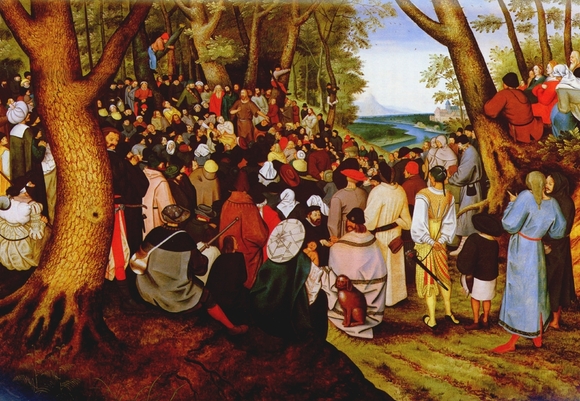 We’ve taught Scripture in some challenging settings and circumstances recently. If you’ve ever tried to have family devotions or lead a small group in a living room full of kids and dogs, you have too. I love the way the artist Pieter Breugel the Younger portrays the chaos John the Baptist may have faced with his motley crowd of soldiers and money-grubbing tax collectors. If you look closely you’ll see kids in a tree, a dog, a man working some sort of business deal in the foreground, and rollicking side conversations on the edges. Not what many preachers would call an ideal setting for the Word of God to be proclaimed. But what exactly are ideal circumstances for gathering around God’s word, anyway, and do they actually help? For example, one thing we suppose would help a sermon would be listeners who are quiet, and in a small group discussion, speakers who take turns. But quiet listeners can be asleep, and polite turn-takers utterly disengaged. Lately we’ve contended with chaotic settings, unexpected audiences, translation challenges, and illness. Be we’ve not lacked for lively learners and deeply satisfying experiences. Chaos: Rich led a Bible study on the Shrewd Manager for a group of doctors in Batumi, Georgia last week. (IFES ministries around the globe generally provide more ongoing discipleship support for their graduates than IVCF does in the US, for various reasons. The graduates in Batumi happen to be mostly doctors.) A cancer surgeon, a neurologist, a gastroenterologist and a dentist gathered with us and our host and translator, Tata, who capably leads the IFES movement in Georgia. She had warned us that distractions would abound. Buzzers and cell phones were most decidedly not switched off for the study. One after another would head out to the balcony to discuss a critical patient case, field a babysitting snafu back home, or take a call from mom. One came half an hour late and was utterly confused. Some were reading from the Bible in Georgian, one preferred Russian, and one wanted to use an English version he had, and got tripped up by a translation issue at a key point in the passage. All were from an Orthodox background and had many questions about side and central issues of the faith that they wanted to sneak in to an already difficult passage. The passage initially upset them immensely—something Rich loves when he leads that study. Normally I enjoy watching the tension grow in a room as he accentuates the sheer deviousness of the manager and the seemingly incomprehensible praise he gets for it from his master and then from Jesus. But this time I had visions of the time my mom’s pressure cooker exploded all over the kitchen when I was a child. Is it all about to blow? For a long stretch Tata stopped translating so she could let their heated comments flow freely. Finally, some clarity came, and they thanked Rich exuberantly but then dashed off to more urgent pursuits. What the heck just happened? Did anything sink in? The text messages to Tata the next day indicated that they had appreciated the time very much, but it was all just so chaotic it was hard to tell what landed, as if he’d scattered seeds during a windstorm. Sometimes the only day you get for sowing, there’s a windstorm. Conditions aren’t ideal. Hope says to sow anyway. Tummy Troubles: Overall I’ve been pleased with and grateful for our good health so far on this journey. But the whiplash of going from sunny Batumi to snowy (and beautiful) Veluko Turnovo, Bulgaria, messed me up. It may have been the water. In general we don’t worry about water too much in the places we’ve visited, but since slight variations in even good water can cause a reaction, when we think to we drink bottled for the first day or two. I did not do that there. Or, it may have been the meat. Our vegetarianism is on hold for the year, since the diets here are so meat-based that it would be hard to get protein if we turned it all away. But Bulgaria might just take the prize, with its hot dogs and cold cuts at breakfast, chicken stew at lunch, and stuffed beef patties at dinner. For whatever reason, I had a violently upset stomach for most of Saturday, and truly wondered if I could or should give the talk I was scheduled to give that evening. Somehow I sensed God was in it and wanted me summon all the energy I could muster and go for it. I preached on forgiveness from the life of Joseph, focusing on the words of blessing, validation, and perspective that Jacob gives to Joseph in the final days of his life. Jacob’s grandiose gift of a lavish coat arguably set the whole mess in motion; as his life ends all he has left to give Joseph are words, but they are powerful. I believe they propelled Joseph across the finish line to full forgiveness. I am particularly struck by the line, “He was set apart from his brothers.” (Gen. 49:26) Joseph has been fixated on the injustice of being separated from his brothers; Jacob reframes it as being set apart by God from them, for God’s good purposes. I challenged students to seek God’s bigger purposes when they are stuck relationally and to give the gift of perspective to others who are stuck. I know how much I benefit from friends who lift my head and help me see the bigger picture. The students seemed solidly engaged as I spoke, and I heard that my words encouraged several people to seek needed reconciliation in their friendships. And my tummy survived. It wasn’t ideal, but I’m glad I went for it. Mixed Audiences: In my homiletics classes we talk a lot about the challenges and the goodness of preaching to a diverse audience. It stretches us as preachers and it keeps us on our toes. I preach with more energy and humor when I know the teens will not be dismissed to do their own thing but will be in the room. I preach with more sensitivity to how a given word will land when I know that listeners will be present who have endured great tragedies or persistent forms of racism, economic hardship, etc. But there is a certain ease and expectation that we rest on when we think we know who will be present. I thought I knew roughly who would be there when a pastor in Georgia asked me to give a seminar on preaching. I had been asked for a similar seminar in Belarus, and the gathering had consisted of the staff of a church, including three sharp interns pursuing doctorates in music, historiography, etc. The concept of a sermon needing to unfold like the score of a symphony or the plot of a novel found immediate uptake and we were off to the races, discussing narrative arcs, tension and resolution, and inductive vs. deductive strategies. So in searching for a category in which to place the pastor’s request, I committed the fallacy of assuming that the present would be something like the past. It was clear the moment I walked in the door to the church in Georgia that this gathered group was ever so slightly different. A knot of elderly men, current and retired pastors, unfolded to greet me; a group of teenaged girls smiled their hellos. Suddenly it dawned on me that this gathering was something more like a midweek service, and I was something more like the preacher. “Pastor, do you have your Bible?” the pastor gently asked me, looking slightly worried. My Bible this year is on my Kindle only; it was charging back where we were staying. I had a brief wave of imposter feelings—what kind of preacher doesn’t come with a Bible? I gratefully selected a large, leather-bound English Bible from his study. I quickly realized that what I needed to do was not so much teach on preaching as preach good news to faithful servants who proclaim the gospel in all sorts of way throughout their weeks. I pondered the fact that some of these older men, who might not know a deductive point from an inductive one, had preached through communism, for goodness sake, while I was fussing about a prom date or a bad hair day. And yet they were coming to hear from me? I glanced down at my page of jumbled notes on inductive strategies, crossed a bunch of things out, and scribbled down six phrases:
 The artist Grunewald captures John’s calling to be a finger pointing to Christ so well here. What a privilege, under any circumstances. What are the circumstances with which you contend as you try to speak good news these days? Hopefully they aren’t utterly ideal in the sense of smooth and seamless—that seems less conducive to dynamic encounters. I hope you’ll press through the challenges and look for the surprising work of God in unlikely situations. Blessings on you as you point to Jesus this week. (This reflection on John the Baptist captures what I love about him in words more eloquent than mine: http://heroesfoundfaithful.blogspot.ro/2010/12/john-baptist.html.) As you pray for us in the coming days: Rich is speaking tonight on Situational Leadership for a secular audience at a university tonight here in Romania. Thursday we head to the fall conference of the Romanian campus fellowship, where we will both teach on various topics, from mentoring to women in leadership. Please, as always, pray for health, resilience with the challenges of travel, and hearts of love for those we meet.
2 Comments
nancy washington
11/4/2014 02:51:24 am
Admire your quick flexibility of changing gears when you saw the mix of people for that sermon on preaching... I enjoy all the reflections - culture, etc. you both share.... BUT, what kind of mother must you have had who would allow a pressure cooker to blow up in the kitchen?? No one I know, I'm sure
Reply
Daniel Hogshead
11/6/2014 06:48:28 am
Rebekah and I enjoyed reading this post. As teachers, we could very much relate to the desire for "ideal" circumstances. Thanks for encouraging us to look for how God is working, especially in less-than-perfect conditions.
Reply
Leave a Reply. |
Archives
April 2024
AuthorRich and Lisa Lamb Categories |
 RSS Feed
RSS Feed